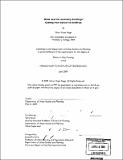What next for accessory dwellings? : getting from bylaws to buildings
Author(s)
Stege, Elinor Hope
DownloadFull printable version (14.12Mb)
Other Contributors
Massachusetts Institute of Technology. Dept. of Urban Studies and Planning.
Advisor
Terry Szold.
Terms of use
Metadata
Show full item recordAbstract
Accessory dwellings-secondary, self-contained housing units on the same property as a primary residence, either attached to or detached from the main dwelling, and subordinate in size, location and appearance-are recognized by planners, homeowners, and occupants alike as an efficient tool for supplying the smaller, more varied, and more flexible housing stock needed now and into the future. While many municipalities have legalized accessory dwellings and added them to their palette of housing tools, it is readily apparent that passing a bylaw alone is not enough to create units on the ground. Upon this realization, places such as Barnstable, Massachusetts and Santa Cruz, California have turned with varying success to four major strategies for encouraging accessory apartments: tying to other initiatives, providing funding, "handholding" programs, and further revisions to bylaws. This investigation considers how the Boston suburbs of Newton, Lexington and Lincoln, Massachusetts have applied versions of these strategies to their own attempts to encourage accessory dwellings and finds several underlying barriers to creating accessory dwellings. The impediments include lack of homeowner motivation, insufficient planner advocacy, prohibitive zoning bylaws, and complicated ties to affordable housing standards. These remaining barriers are the basis for recommending several actions planners can take to make accessory dwellings an appealing and viable housing tool, and for giving specific next steps forward in the three cases of Newton, Lexington, and Lincoln.
Description
Thesis (M.C.P.)--Massachusetts Institute of Technology, Dept. of Urban Studies and Planning, 2009. Includes bibliographical references (p. 107-114).
Date issued
2009Department
Massachusetts Institute of Technology. Department of Urban Studies and PlanningPublisher
Massachusetts Institute of Technology
Keywords
Urban Studies and Planning.